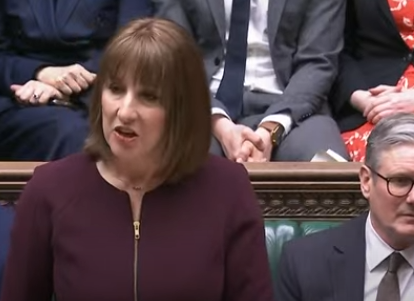Charities face increased demand for support from disadvantaged families, including those with disabilities, following benefit cuts announced by Chancellor Rachel Reeves in her Spring Budget, sector leaders and experts are warning.
Reeves announced measures to shave £5bn from the UK’s benefits bill as she looks to make an additional £14bn in savings.
Department for Work and Pensions analysis suggests more than three million people will lose out by 2029/30, with families losing an average of £1,720 a year.
More than 370,000 people who claim personal independent payments will mist out, while a further 430,000 looking to apply in the future will no longer be eligible.
Andy Pitt, head of charities at Rathbones Group, says that the cuts “will undoubtedly place increased pressure on the UK’s charity sector”.
This comes as charities are “already under financial strain” with two in three charities telling the firm that their financial health had deteriorated since the start of the cost-of-living crisis.
“A key reason for this was that nearly 80% had seen their organisation’s annual income fall, while 83% said demand for their services had increased,” he added.
“This mismatch between income and demand for services is forcing many charities to take seriously drastic action – 51% of the senior charity executives surveyed said their charities had sold assets such as property to generate extra income, and 49% said they had cut back on services. The UK charity sector has always been resilient and will no doubt do its best to adapt to the new environment.
“But given today’s news, and the adverse impact this will have on individual circumstances, this problem, particularly amongst local charities’, is likely to get worse.”
Youth homelessness charity Centrepoint is also concerned, saying the benefit cuts would “place even more pressure” on frontline services and are “the wrong choice".
“Cuts like this jeopardise the positive impact the announcements on housebuilding and employment support could have on those on the lowest incomes,” said Centrepoint’s policy and research manager Tom Kerridge.
“Many of those on the receiving end of these cuts are already vulnerable and will be placed at greater risk of serious ill-health, poverty and homelessness.”
He added: “The government seems to have limited options - but these cuts feel like the wrong choice to have taken.”
Disability charity concerns
Meanwhile, Disability Rights UK social security campaigner Mikey Erhardt said he is “shocked” at cuts to the benefits “that disabled people rely on”.
He is particularly concerned about a freeze on universal credit for new claimants which will “drive more disabled people into even deeper poverty”, especially with plans to cut personal independent payments.
“MPs can block these dangerous cuts. We urge them to publicly commit to voting against reducing Disabled people's incomes – both those announced today and those in last week’s green paper,” said Erdhardt.
“Labour MPs in particular must ask themselves why their cabinet colleagues are demonising and punishing Disabled people for the economic failures of successive governments rather than looking to the rich to plug the funding gap.
Ali Gunn, interim director of communications at disability charity United Response, said: “The moral argument used to justify welfare cuts becomes unstuck when the Spring Statement focuses on investing in technology and AI companies rather than improving lives.
“We are calling on the government to support, not threaten, people into work and to implement the immediate funding and plans to cut waiting list times for Access to Work.
“Rather than pitting working people against those out of work the government should invest in social care and unlock opportunities for the 4.8% of people with learning disabilities out of work.”
Latest News
-
Charities should deploy AI ‘around real user needs’ not ‘internal assumptions’, says report
-
Improved NHS mental health support prompts charity’s closure
-
Scramble to house 87 people following homelessness charity’s sudden closure
-
Philanthropist hands health charity record £1m donation
-
OSCR’s transparency changes come into force this month
-
Monday movers - 2 March
Charity Times video Q&A: In conversation with Hilda Hayo, CEO of Dementia UK
Charity Times editor, Lauren Weymouth, is joined by Dementia UK CEO, Hilda Hayo to discuss why the charity receives such high workplace satisfaction results, what a positive working culture looks like and the importance of lived experience among staff. The pair talk about challenges facing the charity, the impact felt by the pandemic and how it's striving to overcome obstacles and continue to be a highly impactful organisation for anybody affected by dementia.
Charity Times Awards 2023
Mitigating risk and reducing claims

The cost-of-living crisis is impacting charities in a number of ways, including the risks they take. Endsleigh Insurance’s* senior risk management consultant Scott Crichton joins Charity Times to discuss the ramifications of prioritising certain types of risk over others, the financial implications risk can have if not managed properly, and tips for charities to help manage those risks.
* Coming soon… Howden, the new name for Endsleigh.
* Coming soon… Howden, the new name for Endsleigh.
Better Society

© 2021 Perspective Publishing Privacy & Cookies














Recent Stories